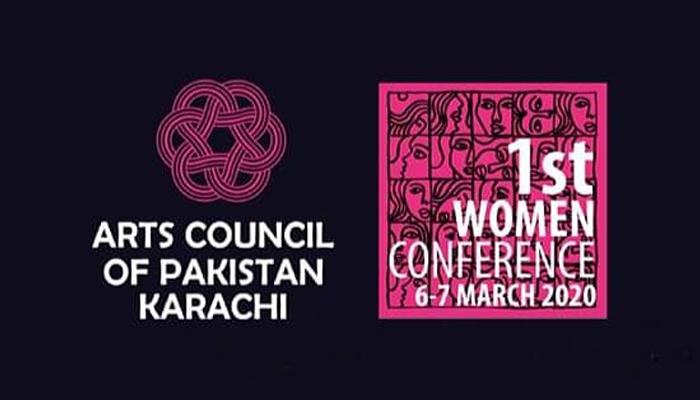KARACHI: This is a press conference for Pakistan's more than 100 million women, Arts Council of Pakistan (ACP) President Muhammad Ahmed Shah said Wednesday while addressing a presser for the First Women Conference.
The ACP has scheduled a First Women Conference on March 6-7, 2020, in Karachi, ahead of the International Women's Day, which is celebrated on March 8.
"There is extremism and emotional slogans from both sides and that is a conspiracy to shift the focus away from women's real problems," said Shah, who was accompanied by Sindh minister of women development, Shehla Raza, playwright Haseena Moin, rights activist Anis Haroon, and Sadiqa Salahuddin from the development sector.
Noting that the country's women were "working successfully in all walks of life", the ACP president said: "A woman's life is incomplete without a man."
"We have to highlight the violence against women (VAW) and we have to struggle to prevent the injustices towards women but do so by staying in the bounds of our cultural norms.
Jinnah 'safeguarded women's rights'
"We have to set up laws that would allow more than half of Pakistan's population to participate in matters pertaining to the country's progress, in turn, allowing us to positively benefit from our human capabilities.
The First Women Conference, Shah added, was organised "to deliberate on these challenges".
In this regard, Raza, the provincial minister, said: "We have to collectively raise our voices for women's rights. There are many laws in our country but we have to think about their implementation.
"Our Quaid [Muhammad Ali Jinnah] always safeguarded women's rights and made laws for them. Under his guiding principles, we have run campaigns on the dangers of child marriages, lack of education for women, and women's role in the society, among other things," she added.
'Women are not products'
Moin, the playwright, emphasised that women should never be fearful or terrified but should, instead, "work on building courage, strength, and morale".
"Women are not products; they have their own identities. If you read Surah Al-Nisa, then you'd know completely what women's rights are," she noted.
Rights activist Haroon said the VAW should end and stressed that all men women were equal. "We want to talk about women from all over Pakistan — whether they are from education or health sector or are those who have faced oppression — in our First Women Conference.
"Women should stand on their own feet; when they do that, they can better work on getting their rights," she stated.
'Speeches do not yield results'
Salahuddin, the development sector official, underlined how education was extremely important for women. "We don't often talk about the severity of the matter of why women are unable to access or continue their education.
"There are some issues that should be talked about in detail. Mere speeches do not yield any results. We have to agree on a practical strategy through the First Women Conference," she said.
Sessions in First Women Conference
The event, which starts Friday, will be introduced by keynote speakers I A Rehman, a rights advocate, and Justice (r) Nasira Iqbal. Shah, the ACP president, would present the opening remarks.
Sessions scheduled for the First Women Conference include "Meri Zindagi Mera Ikhtiyar," "Economic Empowerment of Women," and "Role of Media in Women Empowerment." Two theatre performances are slated for the first day, which would conclude with performances by Sheema Kermani, a cultural activist and the founder of Tehrik-e-Niswan Organization, as well as ACMA - The Band.
The topics of talks on the second day are: "Yeh Haath Salamat Hein Jab Tak," "Taleem Bunyadi Haq," "Aurat Pe Tashaddud Kyun?," "Role of Women in Parliament," and "Sehatmand Aurat Sehatmand Muashra."
On the final day, Khalid Ahmed and Kaif Ghaznavi would offer a recitation, with musical and dance performances by Nazia Zuberi and Tehreema Mitha, respectively, "A talk with Bushra Ansari" by Yasir Hussain, and a "Khawateen Mushaira" presided by feminist Urdu poet Kishwar Naheed.
-
Security forces gun down 30 terrorists in multiple IBOs in KP: ISPR
-
MQM-P calls for new province in Sindh
-
US report validates Pakistan military edge over India: PM
-
Banned TTP poses serious threat to Pakistan security: UNSC panel
-
CM Afridi clarifies remarks on by-poll after ECP requests army deployment
-
Dubai sees 3.2m Pakistani passengers in 2025 as airport sets new milestone
-
Security forces kill 23 Indian proxy terrorists in KP's Kurram
-
Pakistan to construct island to boost oil exploration: report












